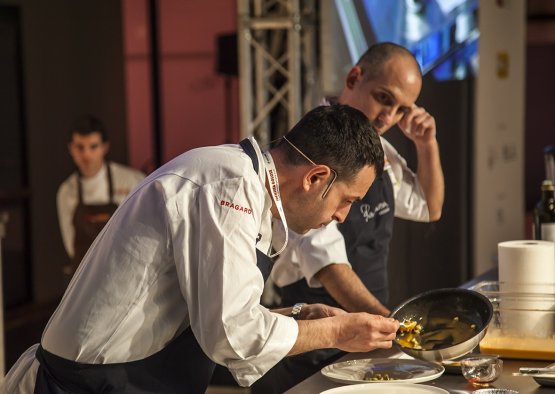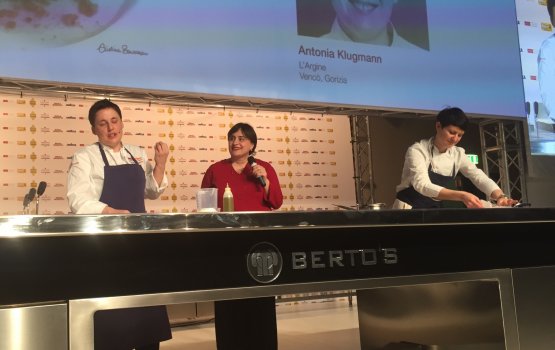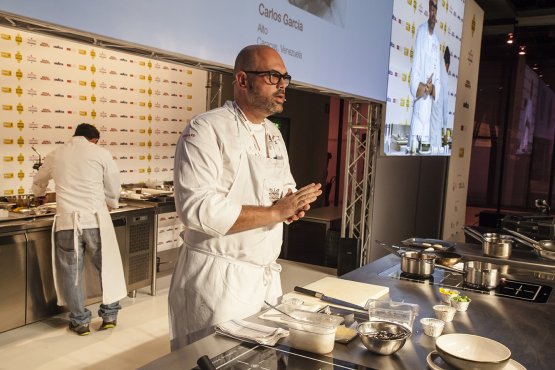The strength of freedom? The roaring rebeldia of Carlos Garcìa and his black fish filet, the only black allowed in a nation like Venezuela “that wants to emancipate itself from the slavery of petrol”. But also the horizontal, constant dialogue between dining room and kitchen connecting restaurants north of the equator such as Nerua in Bilbao and Contraste in Milan. Or the international appeal of the Mediterranean soup full of Asian nuances aromatising the dishes by Ricard Camarena, chef at the homonymous restaurant in Valencia. Each gives their interpretation, each presents it with the same necessary and urgent strength, free cooks in free kitchens, peace mediators one could say, in that each one of them adds an essential portion of ethics, the entrails of contemporary cuisine.

Ricard Camarena: Valencian broth
Afternoon overture in the auditorium with futuristic broths by Camarena, illustrated in “Caldos, el código del sabor”, a book by the chef from Valencia in which he codifies the five flavours without leaving anything behind, generating “dishes that look like those of no one else”. For instance? For instance a consommé with tamarind, a very common fruit in South East Asia with a high level of acidity, soy, anchovy colatura but also lemon juice, black thyme and citronella. A journey from the Mediterranean Sea to Asia in a spoon.
Latin avantgarde, part two. After Atala and Acurio, that is to say Brazil and Peru, Venezuela stands out in the Latin American culinary scene with Carlos Garcìa chef at Alto in Caracas. He’s the soul behind the Red-White foundation which works hand in hand with producers, contributing to stop the exodus from the countryside to the city, that is to say the overpopulation that often leads to an intolerable level of criminality. “We pay the correct price and ask for high quality, so farmers and breeders have found a worthy way of living”.

Antonia Klugmann’s kitchen garden, "a room of one’s own"
Hence cooking becomes a medium of peace. The same refrain was the background to the lesson by
Sergio Capaldo and
Luca Cantù (restaurant La Granda in Savigliano, Cuneo), who on the most imposing stage of Identità Golose showed how deboning an ovine tail requires the same funambulist care of a crochet needle work. “Putting the work of a breeder, a carver and a chef on the same level, this is freedom – boomed Capaldo – knowledge is freedom, that is to say connecting head to hands once again, like real artisans do, respecting our terroir”.
The two-voice lesson by Josean Alija of Nerua, the restaurant inside the Guggenheim Museum in Bilbao and Matias Perdomo the chef at Contraste in Milan, travelled between Bilbao, Uruguay and Milan. Their voices are like a lightning launched towards the far future, innovators without limits, even in the intention of removing the barriers between dining room and kitchen. Among the Perdomo’s keywords, unearthed in the dialogue with sous chef Simon Press and Italian maître-sommelier Thomas Piras: the keyhole, which represents the transparency of an open view kitchen, the table, which the client finds completely empty upon his arrival, the mirror-menu to be tailor made based on the client’s wishes.

Carlos Garcia: mainland in Venezuela
The last act is handed to
Antonia Klugmann captain at
L’Argine in Vencò, in the province of Gorizia, who addressed the issues of women’s in the profession and creative freedom. “I’ve been asked many, too many times, how come there are so few women considered creative. It is true. I’ve asked myself what should a creative person need and I answered myself with
Virginia Woolf. Women have been having money, have been studying, travelling for no more than a hundred years, these are essential requisites for a mature life, rich of ideas”. Even in the kitchen.